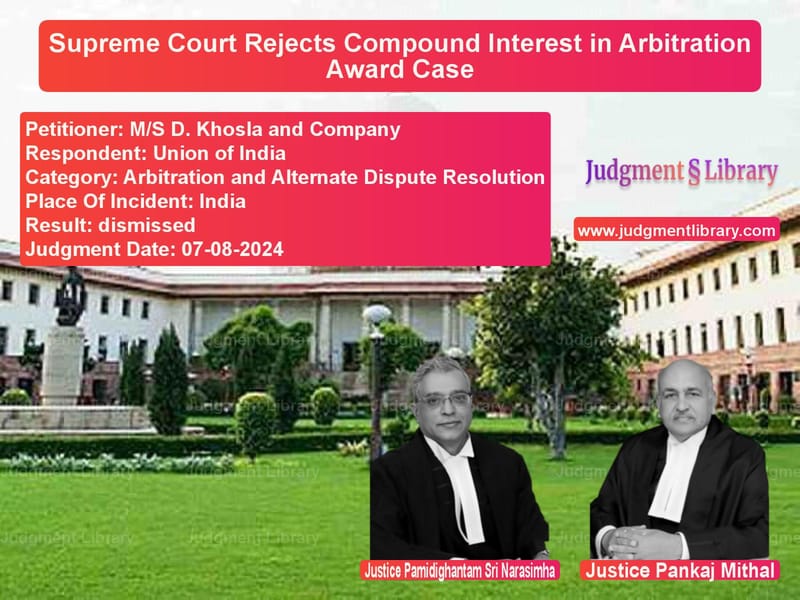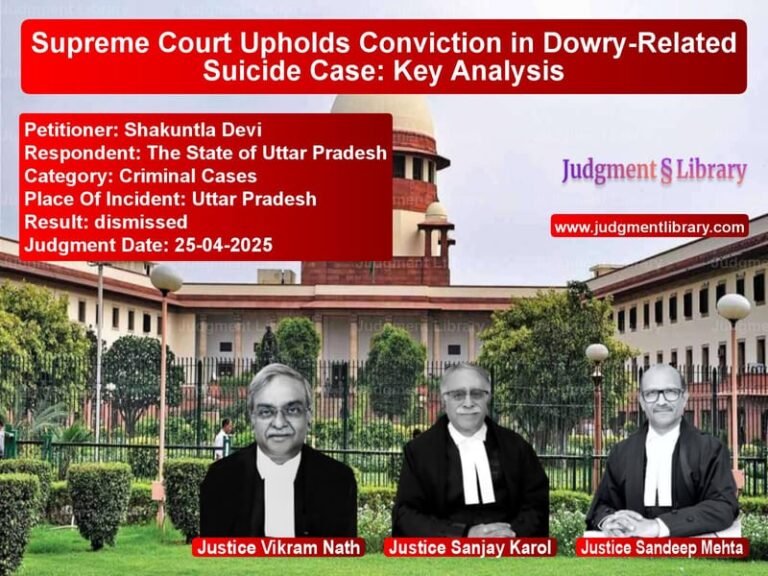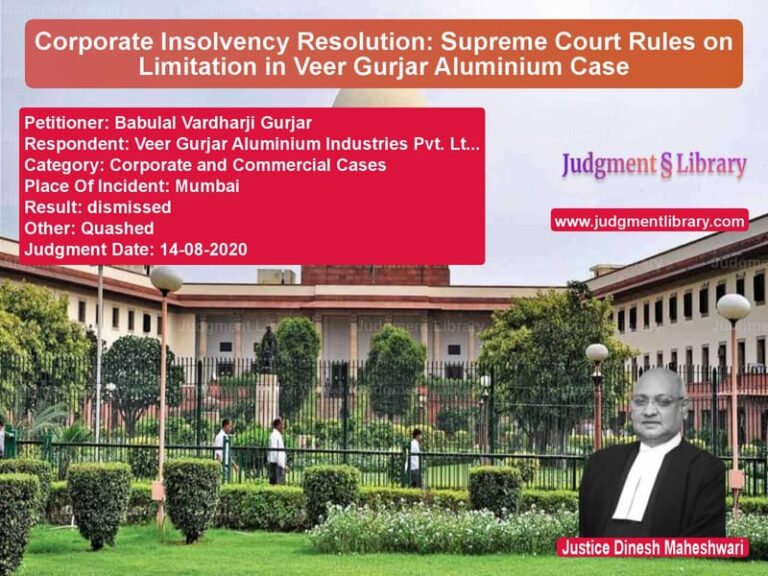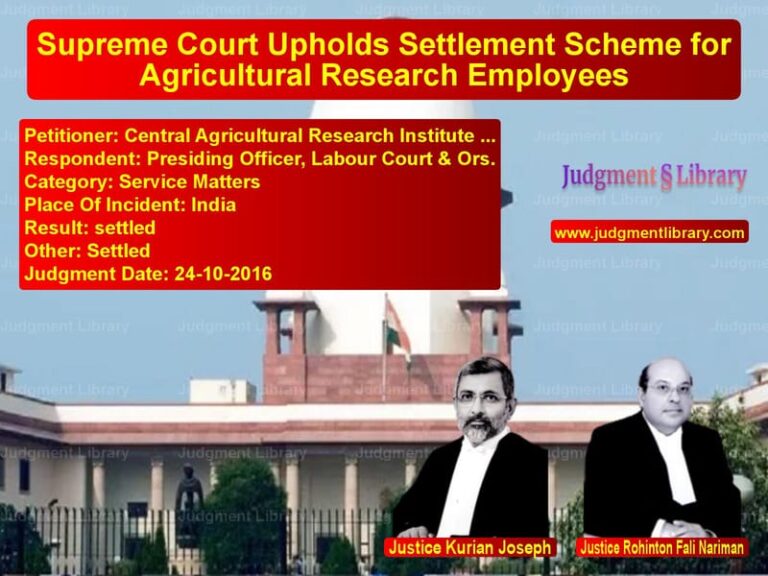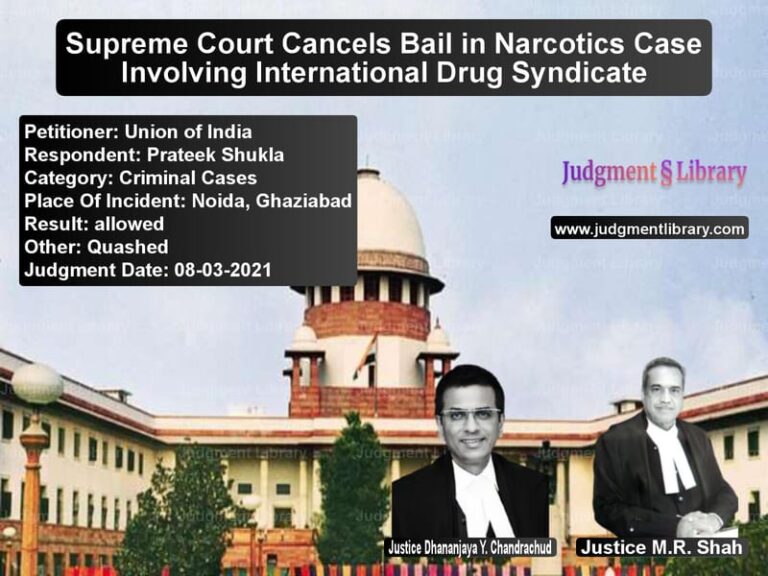Supreme Court Rejects Compound Interest in Arbitration Award Case
In a significant ruling, the Supreme Court of India has dismissed the plea of M/S D. Khosla and Company, which sought compound interest on an arbitration award against the Union of India. The judgment clarifies the legal position on interest calculations in arbitration awards and affirms that unless explicitly provided by statute or contract, courts cannot award interest on interest.
Background of the Case
The dispute arose from a contract executed in 1984-85 between M/S D. Khosla and Company and the Union of India. Following disagreements, arbitration proceedings were initiated, leading to an award on September 17, 1997, under the Indian Arbitration Act, 1940.
The arbitrator ruled in favor of M/S D. Khosla and Company, awarding them Rs. 21,56,745 along with interest:
- 12% per annum simple interest from the date of completion of work until the award date.
- 15% per annum simple interest from the award date until payment or court decree, whichever was earlier.
The decree passed in accordance with the award stated:
“Opponent No.2 – Union of India is hereby ordered to pay interest @12% per annum on the awarded amount up to the date of the award and interest @15% per annum from the date of the award till realization of the decretal amount as per the terms of the award.”
Petitioner’s Argument
M/S D. Khosla and Company contended that the awarded 12% interest for the pre-award period should be considered part of the principal sum. They argued that the 15% post-award interest should apply not only to the original principal amount but also to the 12% pre-award interest.
Read also: https://judgmentlibrary.com/arbitration-clause-in-insurance-disputes-key-legal-insights/
Their counsel stated:
“12% interest per annum awarded for the pre-award period is part of the principal sum and has lost its character as separate interest. Therefore, 15% interest per annum awarded for the post-award period should be applicable to the principal sum plus the 12% interest.”
Respondent’s Argument
The Union of India, represented by Additional Solicitor General Aishwarya Bhati, countered the argument by asserting that interest on interest cannot be awarded unless explicitly stated in the arbitration award or a relevant statute.
Their counsel emphasized:
“Though there is no controversy regarding the arbitrator’s power to award compound interest in a given case, it cannot be assumed unless explicitly granted by the award or court order.”
Supreme Court’s Observations
The Court analyzed key legal provisions, including:
- Section 29 of the Arbitration Act: Courts may order interest only on the principal sum adjudged by the award.
- Section 34 of the Code of Civil Procedure (CPC): Interest is payable only on the principal amount adjudged, not on accrued interest.
- Interest Act, 1978 (Section 3(3)): Prohibits courts from awarding interest on interest unless explicitly allowed by statute or contract.
The Supreme Court cited previous rulings:
- ONGC v. M.C. Clelland Engineers S.A. (1999): Arbitrators can grant interest but not compound interest unless the contract permits it.
- State of Haryana v. S.L. Arora & Company (2010): Interest, unless specified otherwise, refers to simple interest, not compound interest.
- Hyder Consulting (UK) Ltd. v. State of Orissa (2015): Distinction between “sum directed to be paid” (which includes pre-award interest) and “principal sum adjudged.”
Based on these precedents, the Supreme Court concluded:
“The award and decree do not explicitly state that 15% post-award interest applies to both the principal amount and the pre-award interest. In the absence of a clear provision, we cannot infer compound interest.”
Final Judgment
In its ruling, the Supreme Court dismissed the petition, affirming the decisions of the Principal Senior Civil Judge and the High Court:
- Interest shall be calculated as simple interest, not compound interest.
- No additional interest shall be awarded on the pre-award interest.
- The awarded amount shall remain Rs. 21,56,745 with applicable simple interest rates.
Conclusion
This ruling sets a clear precedent on interest calculations in arbitration cases. It reinforces that courts cannot grant compound interest unless expressly provided by statute or contract. The decision provides clarity to businesses and legal practitioners on the limitations of post-award interest in arbitration matters.
By upholding simple interest calculations, the Supreme Court ensures fairness while maintaining consistency in judicial interpretations of arbitration awards.
Petitioner Name: M/S D. Khosla and Company.Respondent Name: Union of India.Judgment By: Justice Pamidighantam Sri Narasimha, Justice Pankaj Mithal.Place Of Incident: India.Judgment Date: 07-08-2024.
Don’t miss out on the full details! Download the complete judgment in PDF format below and gain valuable insights instantly!
Download Judgment: ms-d.-khosla-and-co-vs-union-of-india-supreme-court-of-india-judgment-dated-07-08-2024.pdf
Directly Download Judgment: Directly download this Judgment
See all petitions in Arbitration Awards
See all petitions in Enforcement of Awards
See all petitions in Dispute Resolution Mechanisms
See all petitions in Judgment by P.S. Narasimha
See all petitions in Judgment by Pankaj Mithal
See all petitions in dismissed
See all petitions in supreme court of India judgments August 2024
See all petitions in 2024 judgments
See all posts in Arbitration and Alternate Dispute Resolution Category
See all allowed petitions in Arbitration and Alternate Dispute Resolution Category
See all Dismissed petitions in Arbitration and Alternate Dispute Resolution Category
See all partially allowed petitions in Arbitration and Alternate Dispute Resolution Category

